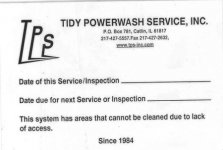Phil Ackland
KEC Expert
Feb. 26th 2003
Dear Exhaust Cleaners
I just returned from the Phoenix NFPA 96 Committee meeting where we looked at proposals for the 2004 #96 Standard.
There I learned how some very important people are “interpreting” the 96 and it was scary.
If your Cleaning Certificates or any other documentation you use says “Inspect or Clean the exhaust system in accordance to NFPA 96” (or words to that effect), I suggest you give serious thought to tearing them up and burning them immediately.
Why?
Because according to some fire investigators (who are taking cleaners to court), this wording means you are inspecting and cleaning in accordance with every Section, Chapter and Verse of the ENTIRE 96 Standard.
So, according to this line of thought, if there is anything wrong with any part of the system you were recently in, then you are liable. (Look up Application in NFPA #96 1.3.1* 2001ed.) I absolutely disagree with this argument, but that won’t help you in the short term.
And, if you are claiming to be “Certified” than it is even worse (according to them).
I will explain more later. But what do you think?
This message shall be applied as a united whole

Dear Exhaust Cleaners
I just returned from the Phoenix NFPA 96 Committee meeting where we looked at proposals for the 2004 #96 Standard.
There I learned how some very important people are “interpreting” the 96 and it was scary.
If your Cleaning Certificates or any other documentation you use says “Inspect or Clean the exhaust system in accordance to NFPA 96” (or words to that effect), I suggest you give serious thought to tearing them up and burning them immediately.
Why?
Because according to some fire investigators (who are taking cleaners to court), this wording means you are inspecting and cleaning in accordance with every Section, Chapter and Verse of the ENTIRE 96 Standard.
So, according to this line of thought, if there is anything wrong with any part of the system you were recently in, then you are liable. (Look up Application in NFPA #96 1.3.1* 2001ed.) I absolutely disagree with this argument, but that won’t help you in the short term.
And, if you are claiming to be “Certified” than it is even worse (according to them).
I will explain more later. But what do you think?
This message shall be applied as a united whole
Last edited:


